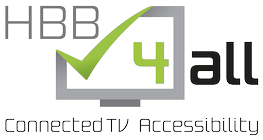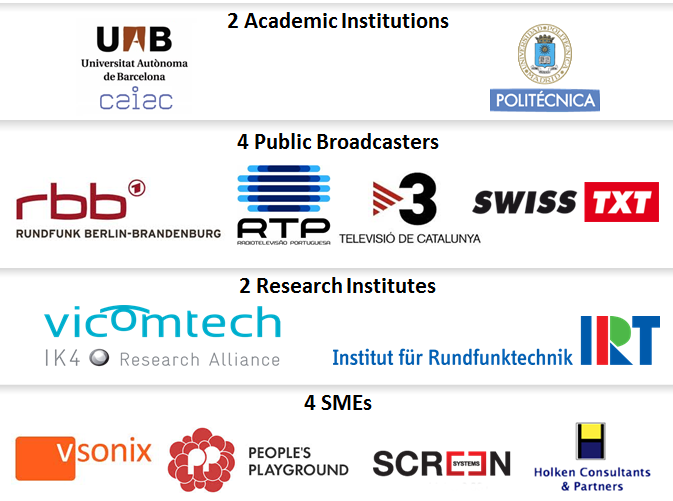European HbbTV accessibility project launched
Wednesday, March 19th, 2014
European Connected TV: From the Accessibility Vision into Market Reality
Press Release
PARIS, France — The HBB4All consortium is proud to announce the start of the European project HBB4ALL (Hybrid Broadcast Broadband for All).
The project addresses media accessibility for all citizens in the connected TV environment. HbbTV (Hybrid Broadcast Broadband TV) is a European standard increasingly adopted by European broadcasters. One of the challenges in the coming years will be the delivery of multi-platform audiovisual content (anytime, anywhere, any device) and making this content accessible for all. The elderly and people with various disabilities rely on subtitles, audiodescription or sign language. Customizing accessibility services through options for personal preferences is only one example of future possibilities.
HBB4ALL is co-funded by the European Commission under the Competitiveness and Innovation Framework Programme (CIP). The project started in December 2013 and runs for 36 months. The official kick-off meeting was hosted in Barcelona (13/14 January 2014) by HBB4ALL coordinator UAB (Universitat Autònoma de Barcelona, Spain).
Main objectives
The HBB4ALL project aims at:
- Advancing future-proof solutions for improved accessibility to media, both utilizing and supporting the successful uptake of HbbTV throughout Europe;
- Introducing and large scale user testing of such innovative services in at least three European countries;
- Introducing and expert testing of novel workflows for the production of accessibility services at European broadcasters;
- Understanding interoperability in a multi-platform and multilingual environment to test easy solutions for media accessibility;
- Benchmarking quality of access services from a user-centric approach and promoting accessibility as an added value for education and social inclusion;
- Becoming a major platform/player in the e-Inclusion economy currently taking place, fostering the future market take-up of exciting innovations in conceiving universal accessibility tools and concepts to satisfy the diverse interests of all societal groups.
The project will examine the delivery of TV content to PC, tablet, smartphone and TV’s with an array of communication solutions such as subtitling, audio description, clean audio, and many customizable features. Multiple EU languages, large and small, sign language, and language situation – monolingual, bilingual – will be taken into consideration as well as the three translation modes: dubbing, subtitling, and voice-over.
For this purpose, the project will test access services in various pilot implementations in three European countries and gather user feedback to assess the acceptance and the achievable quality of service in the various delivery scenarios (broadcasting, hybrid, full IP). Four interlinked sub-pilots will be implemented in the HBB4ALL project:
- Pilot-A: Multi-platform subtitle workflow chain,
- Pilot-B: Alternative audio production and distribution,
- Pilot-C: Automatic UI (User Interface) adaptation – accessible Smart TV applications,
- Pilot-D: Sign-language translation service.
On this basis, HBB4ALL will elaborate pertinent guidelines, guides of good practice, metrics, and recommendations. It will initiate campaigns to promote the project results and thus raise awareness not only on the necessity of access services but also on the technical solutions available. For that purpose, and to transform the accessibility vision into reality, HBB4All targets all relevant stakeholders of the value chain from content providers to user associations.
The Consortium

The consortium includes 12 European partners, two of which are academic institutions, four broadcasters, two research institutes and four SMEs, all experts in the field of media accessibility.
Latest News
- Barb to start reporting TV-set viewing of YouTube channels
- SAT FILM selects multi-DRM from CryptoGuard
- Qvest and ARABSAT to launch OTT streaming platform
- ArabyAds & LG Ad Solutions partner with TVekstra in Turkey
- Freeview NZ satellite TV service to move to Koreasat 6
- Comscore expands YouTube CTV measurement internationally
